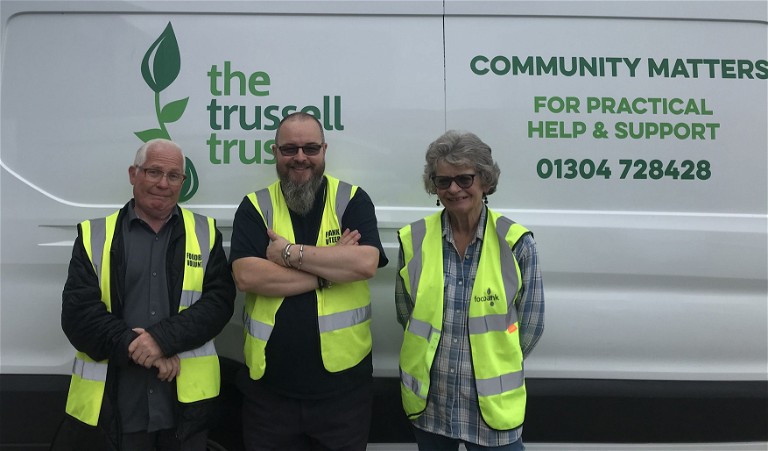BANKING ON YOU
If you only read one article in this issue, make it this one. As we face ever more desperate times, your neighbours need your support – urgently. And if you are struggling yourself, find out how our local Foodbank can help
Words & photography Jonathan Erridge
In acramped office on an industrial unit off Western Road in Deal, Deal Area Emergency Foodbank Project coordinator Sheila Ward sits at her desk, a phone in one hand, her head in the other and a look of concern on her face as she takes the umpteenth call of the morning. It’s a familiar sight to anyone who’s spent any time at DAEF HQ, where the phone rarely stops ringing these days. After just a minute the call ends and Sheila takes a moment to collect herself before rising energetically from her chair, the frown quickly replaced with a bright, warm smile as she apologises for keeping me waiting.
Established in 2012 with support from its parent charity the Trussell Trust, DAEF’s primary function has been to collect food donations for distribution to those in need in the CT14 (Deal, Walmer, Kingsdown), CT3 (Aylsham, Wingham, Hersden) and CT13 (Sandwich, Eastry) postcode areas. There are now three paid members of staff and 70 volunteers.
DAEF partners with care providers in these areas, including social workers, community wardens and school family liaison officers, to identify those in need of support and then provide them with vouchers which can be redeemed for three days’ worth of emergency food. Currently over 2,000 people a year are being helped in this way, but demand is rising all the time, more rapidly in recent months.
We’re not talking for long before the look of concern returns as Sheila tells me, “We’re seeing a lot more people in urgent need.” She recalls just recently sitting in the passenger seat of a client’s car as he “gripped the steering wheel so hard, trying not to cry because he felt ashamed that I was giving him some money”. Another client had been left “emaciated” after surviving for weeks on just one meal a day until someone suggested they contact their local foodbank. While another, almost unbelievably, had resorted to eating cat food as it was all they had left.
Such stories are all too common here, sadly. And with the crushing combination of high inflation and weak economic growth – if not outright recession – forecast for the foreseeable future, the situation shows signs of only deteriorating further.
“We’re all feeling extremely apprehensive,” Sheila says, describing the mood among staff and volunteers. “We have a lot of contact with people, and listening to their stories, I just don’t know how people are going to cope. I just see the need increasing horribly over the next few months, especially as the weather gets cold.”
One way to help people cope is through its government-funded Household Support Fund, with two £40,000 instalments allocated to the foodbank by Dover District Council, the first arriving in January this year, the second in July. This allows DAEF to offer help for individuals and families with utility bills, school uniforms and other essentials, going only to those in the most difficult of circumstances.
Sheila describs one recipient of HSF funds as, “Someone who we just thought, we’ve neve seen someone in such need and distress.” A few hours after providing him with an HSF grant, she saw him again in Poundland “with a big bag full of stuff for his kitchen, you know, things we take for granted like washing up cloths and liquid. His face just beamed. He hadn’t realised that food banks could help him. And that’s the whole point. We need to get the message out. Foodbanks do help people.”
Information courtesy of the Trussell Trust

: volunteer Dave Annand, volunteer coordinator Gary Studley and project coordinator Sheila Ward of the Deal Area Emergency Foodbank
The first tranche of the HSF has already been used, however, and the second is running down rapidly, meaning it is unlikely to last long into the winter.
“ One person resorted to eating cat food – it was all they had left ”
Sheila praises the response of the local community, but pleads for people to do more, particularly stressing the need for food donations, which haven’t been keeping up with demand recently. Financial donations are also welcome.
Likewise, volunteers are always needed and there are part-time paid positions to fill from time to time. For example, a new volunteer coordinator and warehouse manager have just been added to the team, which Sheila described as “an incredibly committed and friendly bunch”. And for anyone considering getting involved, Sheila’s message – her face lights up again – is simply, “Do it!”
HELP
For more information, to volunteer or donate go to dealarea.foodbank.org.uk or call 01304 202442
Food donations can be left at Sainsbury’s, Aldi, Co-op Food and Tesco in Deal; Co-op in Sandwich; Co-op Food in Aylesham; Lidl in Whitfield. Money can be donated at the Nationwide in Deal and Sandwich
To make a quick and easy donation, text DAEF1 to 70085 to donate £1. Change number to donate more, up to £10 (DAEF10)
1 INCREASED NEED
The sharp rise in the cost of energy, food and other essentials, alongside the £20 cut to universal credit in October 2021, has meant that between April 2021 and March 2022, foodbanks in the Trussell Trust network provided more than 2.1 million parcels to people facing financial hardship. This is the first time since the height of the pandemic that foodbanks in the Trussell Trust’s network have provided more than 2 million parcels. As the cost of living continues to soar, foodbank managers in our network are warning of an accelerated crisis across the UK, with more families being forced to the doors of foodbanks in need of emergency food. One manager commented: “The people who come in are telling me they’re scared. People are beside themselves about what the next six months will bring.”
2 NEEDING TO PURCHASE FOOD
“Our supporters continue to generously donate so our network can continue supporting people facing hardship, but these donations are not currently keeping pace with the increased need. This means that foodbanks are having to purchase food and other essentials to supplement what would usually be provided by donations. With the rising cost of food, this will place an increased financial toll on individual food banks.
“Due to the escalating need for emergency food parcels in our region, we have been spending up to £1,000 a week to buy food to make up for the shortfall in essential items for our food parcels. Whilst kind donations of food continue, in order to meet the increase in demand we will have to purchase even more and, with grocery prices spiralling, this is going to cost the foodbank.”
Lorraine Schulze, Project Manager Medway Foodbank
3 INCREASED RUNNING COSTS
Foodbanks will also need to meet the rising costs of energy and fuel bills which keep warehouses, vehicles and distribution centres running.
“Our running costs to heat and light our warehouses and distribution centres have increased, along with fuel costs to run our vans used to deliver food parcels.”
Kathleen Neilly, General Manager, West Lothian Foodbank
4 NEED FOR COLD FOOD PACKS
“As people feel the impact of the cost of living crisis and look to make savings, foodbanks are seeing an increase in need for ‘cold food packs’. This is food that can be eaten without the need for high-energy and high-cost appliances.
“We are having more and more people come to us to say that although they have a cooker or fridge that they are not turning them on as they do not have the money for the meter and so are requesting items to eat that need no cooking at all.”
Pete Criddle, Trustee and Volunteer Bradford North Foodbank
5 EXTENDED OPENING HOURS
“Because everyone is feeling the squeeze of the cost of living crisis, more foodbanks are seeing an increase in people in work coming to their doors. Due to this, foodbanks are needing to change or extend their opening hours so people can pick up an emergency food parcel on their way to or from work.
“We have to open our foodbank earlier in the day at 8am so working people can pick up their parcels on the way to work. Although we have a large proportion of people referred to us who are on benefits, we are seeing more and more people who are working, but whose wages have not increased in line with the rise in the cost of food, fuel and other items needed for a basic living standard.”

The high cost of living is leading to increased need and rising costs for foodbanks. Here are five ways that foodbanks are being impacted
©Providence Doucet, Unsplash
Gill Fourie, Operational Manager Blackburn Foodbank
No-one should have to turn to a charity for something as essential as food. If people are to have enough money to live with dignity, we need our social security system strengthened so that it acts as an effective lifeline for whenever any of us need support. Should you agree everyone in our community should be able to afford life’s essentials, go to action. trusselltrust.org to join the campaign which asks MPs to call for a stronger social security system that supports people every day, not just in times of national crisis.
If you need support, or wish to donate to the charity, visit the Trussell Trust website to find your local food bank: trusselltrust.org